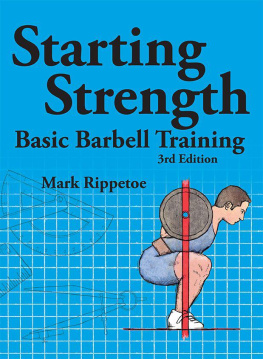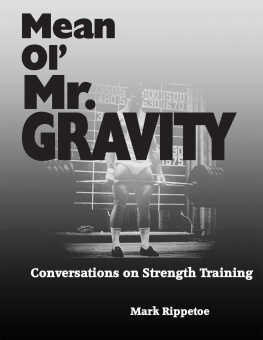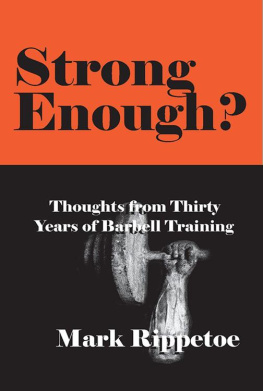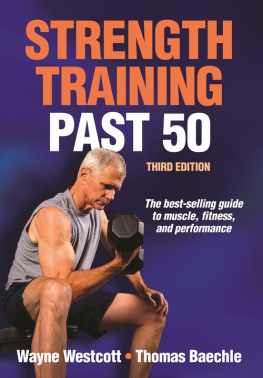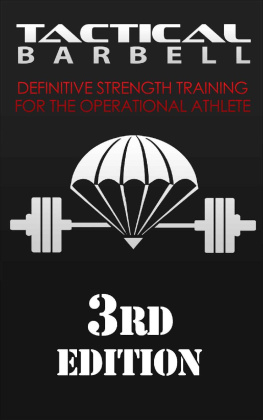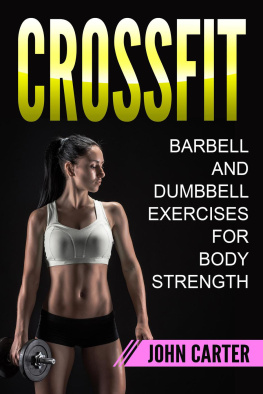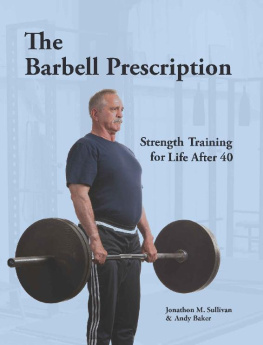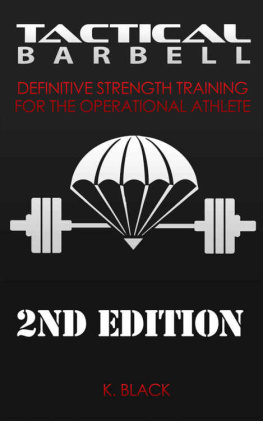Mark Rippetoe - Starting Strength: Basic Barbell Training
Here you can read online Mark Rippetoe - Starting Strength: Basic Barbell Training full text of the book (entire story) in english for free. Download pdf and epub, get meaning, cover and reviews about this ebook. year: 2011, publisher: The Aasgaard Company, genre: Religion. Description of the work, (preface) as well as reviews are available. Best literature library LitArk.com created for fans of good reading and offers a wide selection of genres:
Romance novel
Science fiction
Adventure
Detective
Science
History
Home and family
Prose
Art
Politics
Computer
Non-fiction
Religion
Business
Children
Humor
Choose a favorite category and find really read worthwhile books. Enjoy immersion in the world of imagination, feel the emotions of the characters or learn something new for yourself, make an fascinating discovery.
- Book:Starting Strength: Basic Barbell Training
- Author:
- Publisher:The Aasgaard Company
- Genre:
- Year:2011
- Rating:5 / 5
- Favourites:Add to favourites
- Your mark:
- 100
- 1
- 2
- 3
- 4
- 5
Starting Strength: Basic Barbell Training: summary, description and annotation
We offer to read an annotation, description, summary or preface (depends on what the author of the book "Starting Strength: Basic Barbell Training" wrote himself). If you haven't found the necessary information about the book — write in the comments, we will try to find it.
Starting Strength: Basic Barbell Training — read online for free the complete book (whole text) full work
Below is the text of the book, divided by pages. System saving the place of the last page read, allows you to conveniently read the book "Starting Strength: Basic Barbell Training" online for free, without having to search again every time where you left off. Put a bookmark, and you can go to the page where you finished reading at any time.
Font size:
Interval:
Bookmark:
Starting Strength
Basic Barbell Training
3rd Edition
Mark Rippetoe
with Stef Bradford

Wichita Falls, Texas
Third edition.
Copyright 2011 by The Aasgaard Company.
First edition published 2005. Second edition 2007.
All rights reserved. No part of this publication may be reproduced, stored in a retrieval system or transmitted in a form by means, electronic, mechanical, photocopied, recorded, or otherwise without the prior written consent of the publisher. The authors and publisher disclaim any responsibility for any adverse effects or consequences from the misapplication or injudicious use of the information presented in this text.
Editor Catherine E. Oliver, Plain English Publications
Layout & Proof Stef Bradford
ISBN-13: 978-0-982-5227-4-5 (cloth)
ISBN-13: 978-0-982-5227-3-8 (paper)
ISBN-13: 978-0-982-5227-2-1 (epub)
ISBN-10: 0-982-52274-6 (cloth)
ISBN-10: 0-982-52273-8 (paper)
ISBN-10: 0-982-52272-X (epub)
Published in the United States of America
The Aasgaard Company
3118 Buchanan St, Wichita Falls TX 76308, USA
www.aasgaardco.com
www.startingstrength.com
Preface
Damned if things havent changed in the four years since the 2nd edition of Starting Strength was written. The Aasgaard Company has changed personnel, I have met lots of people who have taught me many things, and we have had enormous success with what I thought was going to be a book ignored by the industry, academe, and the exercising public. I was right about the fitness industry and the folks with tenured positions, but I was wrong about you. Since 2007 we have taught several thousand people how to do these five lifts in our weekend seminars, and the 2nd edition has sold more than 80,000 copies, making it one of the best-selling books about weight training in publishing history. Thanks.
Now that weve learned some things from you guys the ones weve been busy teaching for four years the previous material in the 2nd edition is screaming for an update. Some of it is stale, incomplete, or just plain wrong, and it cant just lay there like a bureaucrat, badly needing something useful to do but making money anyway. This effort is not just the culmination of a top-to-bottom, year-long rewrite. It is the product of an intensive four-year testing program with many of you serving as the experimental population, one which has improved the teaching method for the five lifts, with an extra one thrown in.
It has also been a four-year school for me, as I have tried to find better ways to explain what I know to be true in terms that are understandable, logical, and, most importantly, correct. Much of this material is not in print anywhere else; hopefully, that doesnt make it wrong. But youre pretty bright, so you can decide for yourself.
The book needed a new look, too. Our hope is that you enjoy the illustrations by Jason Kelly, in a different style than usually found in a fat messy textbook, and that you appreciate Stefs Herculean efforts to make this a better-looking example of the bookmakers art than the previous edition.
Many people deserve thanks for their contributions. In no particular order (certainly not alphabetical):
Dustin Laurence, Dr. Dennis Carter, Dr. Philip Colee, Dr. Matt Lorig, Stephen Hill, Juli Peterson, Mary Conover, Catherine Oliver, Bill Starr, Tommy Suggs, Mark Tucker, Thomas Campitelli, Ryan Huseman, Maj. Ryan Long, Maj. Damon Wells, Andrea Wells, John Welbourn, Brian Davis, Justin Ball, Nathan Davey, Travis Shepard, Paul and Becca Steinman, Mike and Donna Manning, Gregg Arsenuk, Michael Street and Carrie Klumpar, Skip and Jodi Miller, Ahmik Jones, Heidi Ziegele, Lynne Pitts, Kelly Moore, Eva Twardokens, Tara Muccilli, Dan Duane, Shane Hamman, Jim Wendler, Dan John, Jim Steel, Matt Reynolds, Charles Staley, Maj. Ryan Whittemore, John Sheaffer, Will Morris, Andy Baker, T.J. Cooper, Doug Lane, Simma Park, Myles Kantor, Phil Hammarberg, Barry Vinson, Gant Grimes, Josh Wells, Shelley Hancock, Terry Young, Ronnie Hamilton, Anil Koganti, MD, Rufus-dog, Ursa-dog, and Mr. Biggles.
Rip
Chapter 1: Strength - Why and How
Physical strength is the most important thing in life. This is true whether we want it to be or not. As humanity has developed throughout history, physical strength has become less critical to our daily existence, but no less important to our lives. Our strength, more than any other thing we possess, still determines the quality and the quantity of our time here in these bodies. Whereas previously our physical strength determined how much food we ate and how warm and dry we stayed, it now merely determines how well we function in these new surroundings we have crafted for ourselves as our culture has accumulated. But we are still animals our physical existence is, in the final analysis, the only one that actually matters. A weak man is not as happy as that same man would be if he were strong. This reality is offensive to some people who would like the intellectual or spiritual to take precedence. It is instructive to see what happens to these very people as their squat strength goes up.
As the nature of our culture has changed, our relationship with physical activity has changed along with it. We previously were physically strong as a function of our continued existence in a simple physical world. We were adapted to this existence well, since we had no other choice. Those whose strength was adequate to the task of staying alive continued doing so. This shaped our basic physiology, and that of all our vertebrate associates on the bushy little tree of life. It remains with us today. The relatively recent innovation known as the Division of Labor is not so remote that our genetic composition has had time to adapt again. Since most of us now have been freed from the necessity of personally obtaining our subsistence, physical activity is regarded as optional. Indeed it is, from the standpoint of immediate necessity, but the reality of millions of years of adaptation to a ruggedly physical existence will not just go away because desks were invented.
Like it or not, we remain the possessors of potentially strong muscle, bone, sinew, and nerve, and these hard-won commodities demand our attention. They were too long in the making to just be ignored, and we do so at our peril. They are the very components of our existence, the quality of which now depends on our conscious, directed effort at giving them the stimulus they need to stay in the condition that is normal to them. Exercise is that stimulus.
Over and above any considerations of performance for sports, exercise is the stimulus that returns our bodies to the conditions for which they were designed. Humans are not physically normal in the absence of hard physical effort. Exercise is not a thing we do to fix a problem it is a thing we must do anyway, a thing without which there will always be problems. Exercise is the thing we must do to replicate the conditions under which our physiology was and still is adapted, the conditions under which we are physically normal. In other words, exercise is substitute cave-man activity, the thing we need to make our bodies, and in fact our minds, normal in the 21st century. And merely normal, for most worthwhile humans, is not good enough.
An athletes decision to begin a strength training program may be motivated by a desire to join a team sport that requires it, or it might be for more personal reasons. Many individuals feel that their strength is inadequate, or could be improved beyond what it is, without the carrot of team membership. It is for those people who find themselves in this position that this book is intended.
Next pageFont size:
Interval:
Bookmark:
Similar books «Starting Strength: Basic Barbell Training»
Look at similar books to Starting Strength: Basic Barbell Training. We have selected literature similar in name and meaning in the hope of providing readers with more options to find new, interesting, not yet read works.
Discussion, reviews of the book Starting Strength: Basic Barbell Training and just readers' own opinions. Leave your comments, write what you think about the work, its meaning or the main characters. Specify what exactly you liked and what you didn't like, and why you think so.

